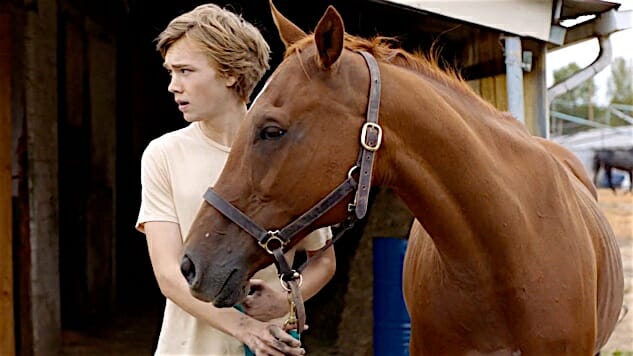Lean on Pete

Lean on Pete flows with such gentle beauty that it may be hard to grasp precisely what it’s about or where it’s going. But the power of writer-director Andrew Haigh’s sublime drama is that it can support myriad interpretations while remaining teasingly mysterious—like its main character, it’s always just a bit out of reach, constantly enticing us to look closer.
Based on Willy Vlautin’s 2010 novel, the movie is a smashing introduction to Charlie Plummer, who was the kidnapped John Paul Getty III in last year’s All the Money in the World. Here, he plays Charley Thompson, a 15-year-old living with his drinking, backslapping dad (Travis Fimmel) in Portland. Charley has a sweet face and a soft-spoken manner—when he talks, the last few words evaporate into the air, as if he’s too shy to even be bold enough to enunciate—but early on, we get a sense that there’s a craftiness underneath that demeanor. The first indication is his willingness to lie about his age to Del (Steve Buscemi), a craggy horse owner who reluctantly takes him on as a caretaker for his elderly racehorse Lean on Pete. Charley doesn’t know a thing about horses, but he’s anxious to find something to do now that he’s in a new town with his father, their reasons for leaving Spokane unspecified but clearly dispiriting.
The first half of Lean on Pete is devoted to Charley’s time with Del, Pete and a jockey named Bonnie (Chloë Sevigny) who’s known Del for two decades. Charley doesn’t talk much—which suits Del just fine, since he doesn’t feel much like being a mentor—but once the boy’s dad lands in the hospital, he begins bonding with this old horse who, like him, is a bit lost. Haigh, who previously made two subtle love stories in Weekend and 45 Years, focuses on the growing rapport between teenager and animal, both of them stoic and soulful, keeping their troubles to themselves. Bonnie, a veteran of the racetrack, tries to impress upon Charley that he shouldn’t get attached to Pete—he’s not a pet, she warns him. The sensitive young man doesn’t listen, and so he sets himself up for heartbreak as Del inches closer to the inevitable moment when he’ll have to sell the horse, dooming Pete to the glue factory.
Eventually, Lean on Pete will offer piecemeal hints about Charley’s past, fleshing out its central character with an easygoing confidence. It takes just a few interactions between Charley and his dad, who’s far more outgoing and macho, to glean the life the two men have shared. In addition, there are casual references to Charley’s aunt, once close but now distant, and a mother who walked out inexplicably. And we soon learn that the kid has moved around a lot, which has taught him how to cope and adapt. Sometimes, that’s meant lying to an adult about his age to get a job, but as the film rolls along, Charley’s survival instincts become increasingly apparent, constantly upending our preconceived notions of this timid boy.
Plummer’s remarkably withholding performance leaves Charley somewhat opaque, and as a result, the teenager’s concerned mumblings about the horse’s well-being become a movingly inarticulate expression of a deep longing within him—for a community, for a safe place. He’s in no financial position to buy the horse, but he can’t bear the thought of anything happening to him, either. In a pivotal moment, the indecisive young man will have to act.
-

-

-

-

-

-

-

-

-

-

-

-

-

-

-

-

-

-

-

-

-

-

-

-

-

-

-

-

-

-

-

-

-

-

-

-

-

-

-

-








































